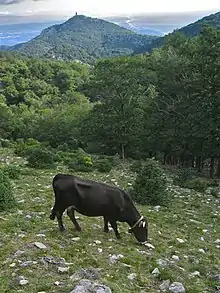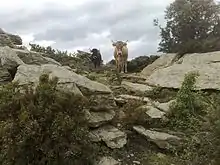Albera (cattle)
The Albera is an endangered breed of small cattle indigenous to the Albera Massif, which divides Catalonia from France and lies partly in the comarca of Alt Empordà in the Catalan province of Girona, and partly in the comarca of Vallespir in the French département of Pyrénées-Orientales.[4] The cattle are highly resistant to cold, though susceptible to heat, and are well adapted to the steep terrain of the massif.[5]:28
 | |
| Conservation status | FAO (2007): endangered-maintained[1]:106 |
|---|---|
| Other names | |
| Country of origin | Spain, France |
| Distribution | Albera Massif |
| Standard | Departamento de Agricultura, Ganadería, Pesca, Alimentación y Medio Natural (in Spanish) |
| Use | meat, vegetation management |
| Traits | |
| Weight | |
| Height | |
| Coat | variable |
| Horn status | small, half-moon-shaped |
| |

History
Although the presence of a cattle breed in the Albera Massif was noted in the nineteenth century, the first description of the Albera dates from 1957. At that time three sub-types were distinguished within the breed: a dark-coated type; a variable paler type; and a third type deriving from cross-breeding with Braunvieh stock. More recently, the types are considered to be two: the Negra, or dark type, and the Fagina, or paler type. In 1999 the Fagina type was found to be genetically closer to the Bruna de los Pirineos breed than to the Albera Negra type.[6]:392
A breeders' association, the Associació de Ramaders de la Vaca de l'Albera, was founded in 2008.[7] The Albera breed received official recognition on 27 July 2011; a breed standard was approved, and a herd book established.[8] At the end of 2014 the total population was recorded as 763, of which 618 were female and 145 male.[9]
Use and management
The Albera is highly resistant to cold, though susceptible to heat, and is well adapted to the steep terrain of the Albera Massif. The cattle are kept year-round in semi-feral conditions, at an altitude between 200 and 1000 metres, foraging for food including the shoots and mast of the beech trees of the massif.[5]:28 They have little contact with man, and little productive capacity: cows calve every two years, and produce barely enough milk for the calf;[2] meat yield is very low, of the order of 35–40%.[5]:30 The cattle are used in vegetation management: by clearing undergrowth they help to prevent forest fires.[6]:387[10]
References
- Barbara Rischkowsky, D. Pilling (eds.) (2007). List of breeds documented in the Global Databank for Animal Genetic Resources, annex to The State of the World's Animal Genetic Resources for Food and Agriculture. Rome: Food and Agriculture Organization of the United Nations. ISBN 9789251057629. Accessed January 2016.
- Breed data sheet: Albera/Spain. Domestic Animal Diversity Information System of the Food and Agriculture Organization of the United Nations. Accessed January 2016.
- Raza bovina Albera: Datos Morfológicos (in Spanish). Ministerio de Agricultura, Alimentación y Medio Ambiente. Accessed January 2016.
- Raza bovina Albera: Datos Generales (in Spanish). Ministerio de Agricultura, Alimentación y Medio Ambiente. Accessed January 2016.
- Miguel Fernández Rodríguez, Mariano Gómez Fernández, Juan Vicente Delgado Bermejo, Silvia Adán Belmonte, Miguel Jiménez Cabras (eds.) (2009). Guía de campo de las razas autóctonas españolas (in Spanish). Madrid: Ministerio de Medio Ambiente y Medio Rural y Marino. ISBN 9788449109461.
- J. Jordana, J. Piedrafita, X. Carre, A. Martell (1999). Conservation genetics of an endangered Catalonian cattle breed (" Alberes"). Genetics and molecular biology 22 (3): 387–394.
- Estatuts (in Catalan). Associació de Ramaders de la Vaca de l'Albera. Accessed January 2016.
- [Departamento de Agricultura, Ganadería, Pesca, Alimentación y Medio Natural] (9 August 2011). Orden AAM/189/2011, de 27 de julio, por la que se crea el Libro genealógico de la raza bovina Albera y se aprueba la reglamentación especíica y su estándar racial (in Spanish). Diari Oicial de la Generalitat de Catalunya 5938: 44602–610.
- Raza bovina Albera: Datos Censales (in Spanish). Ministerio de Agricultura, Alimentación y Medio Ambiente. Accessed January 2016.
- Raza bovina Albera: Usos y sistema de explotación (in Spanish). Ministerio de Agricultura, Alimentación y Medio Ambiente. Accessed January 2016.
![]() Media related to Albera cattle at Wikimedia Commons
Media related to Albera cattle at Wikimedia Commons